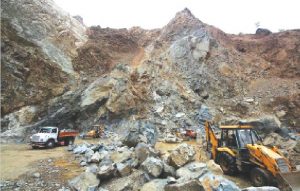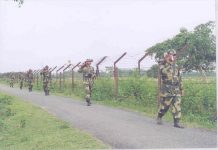 In December 2019, when Kashmir was under a sweeping security lockdown and internet had been snapped, the local administration decided to e-auction minor minerals including sand and gravel from riverbeds and streams. Locals had no way to apply as they couldn’t access internet so bulk of contracts were cornered by the outsiders who could now apply in the wake of the repeal of J&K’s special status. This has not only rendered thousands of manual sand miners jobless, spurring them to resist the “injustice” but also pushed up the cost of the minor minerals, a key construction material.
In December 2019, when Kashmir was under a sweeping security lockdown and internet had been snapped, the local administration decided to e-auction minor minerals including sand and gravel from riverbeds and streams. Locals had no way to apply as they couldn’t access internet so bulk of contracts were cornered by the outsiders who could now apply in the wake of the repeal of J&K’s special status. This has not only rendered thousands of manual sand miners jobless, spurring them to resist the “injustice” but also pushed up the cost of the minor minerals, a key construction material.
One of them is Waheed Ahmad Dar, 45, who has lost out to outsiders. According to him, there are around 100 sites along river Jhelum from Qazigund in south Kashmir to Boniyar in north Kashmir and at each site there are around 100 boats that extract sand manually. Each boat has four labourers who extract sand from river, four more labourers load it on tippers and two labourers are hired for the cleanliness of the shoal and the bund in the area as per the guidelines of Pollution Control Board.
“There are around 1.5 lakh people dependent on mining. All of them either stare at joblessness or a far lesser income than earlier,” says Dar. “These people are illiterate and this is the only job they know. How will they feed their families?”
Before 2019, the local miners were granted short term royalty contracts over small plots of land. But it was after Supreme Court order in 2015, that the extraction of minor minerals including sand, boulders and muck, was to be regulated like major minerals. Under this order all the states of India were asked to frame guidelines to regulate extraction of minerals. According to new rules, the government auctions minor mineral blocks, around five hectares or more in area, with leases granted for a minimum of five years.
Also, under these rules, the four member committees were asked to be set up that work as State Environment Impact Assessment Authority (SEIAA). The authority is assisted by an 18 member committee of State Environment Assessment Committee (SEAC). Once the demarcation of blocks is done, the committees go for tendering and online auctions.
In J&K, rules were subsequently drafted for the mining of minerals from the water bodies. In Kashmir Valley, the water bodies identified for the mining include Jhelum, Sindh and their tributaries. In the first instance at least 260 mineral blocks were identified for auctioning on Jhelum alone.
Though the first auction was held in June 2019, around a month and a half before, the withdrawal of J&K special status, only a few blocks could be auctioned. But it is the auctioning of the rest of the blocks in the middle of the lockdown in December that has become a bone of contention.
“Why was this time chosen? How could we have applied at the time,” said a minor who didn’t want to be identified. “All of a sudden we have been deprived of our livelihood”.
The locals are seething at being made the employees of the non-local lease-holders. The new lease-holders who live outside J&K, many of them reported to be hailing from Punjab and Uttar Pradesh, have sub-contracted the mining to locals.
What is more, with most of the non-local lease-holders, having stayed short of getting mandatory environmental clearances, much of the mining being done is illegal. Illegal mining, in turn, has not only pushed up the costs but also detrimentally impacted the environment as the mining thus done doesn’t follow any environmental safeguards.
“We want the administration to address the situation born out of the rising unemployment among the local miners,” said Dar. “There are so many families who have been hit hard”.
letters@tehelka.com












